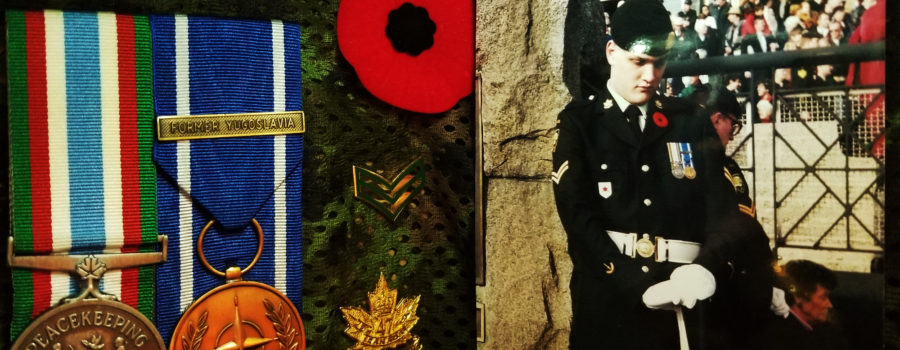A personal perspective from a peacekeeping veteran and writer
Lieutenant Colonel John McCrea, a Canadian physician, penned the emblematic war poem ‘In Flanders Fields’ on the 3rd of May, 1915. He wrote it in the back of a field ambulance a day after the funeral of his friend Lieutenant Alexis Helmer, a funeral that he presided over. This poem was the genesis of the practice of wearing remembrance poppies in Commonwealth Countries and has embedded itself in Canadian culture. For over a century ‘In Flanders Fields’ has been tethered to the narrative of the First World War and has come to be recited every Eleventh of November.
Since I was a little boy this poem has fascinated me, and I can not remember a time that I did not have it memorized. It was when I became a veteran that ‘In Flanders Fields’ took on a whole new level of meaning.
It is difficult to find the right words but I will attempt to explain what I see in these lines. The best way I can illustrate it is to break the poem down piece by piece.
In Flanders fields the poppies blow
Between the crosses, row on row,
Poppies grow out of disturbed soil, and the battlefields of the Great War brought a whole new level of destruction when millions of high explosive rounds churned up the earth. The poppies often grew around the graves of soldiers and it is fitting that this is where McCrea begins his poem.
I see two things in these lines. First is the life that comes from death, which are the poppies that could only spring to life through the killing of so many young men. I would ask you the reader, is there any better epitaph for a soldier than the poppy? Those tiny flowers, born out of violence, red as the blood of the fallen, stand a stoic vigil around places that our finest warriors lay in eternal respite. Soldiers and poppies share more than the same ground, they share a legacy that was born from the pen of John McCrea.
The second is the crosses, which always send a chill down my spine, every cross is a future snuffed out and a life ended in horror. McCrea does not speak of a few crosses he provides us a clear image of far too many rows of grave markers.
That mark our place; and in the sky
The larks, still bravely singing, fly
Scarce heard amid the guns below.
So what marks their place? Is it the crosses or the poppies? Maybe it’s both, but the aspect of this trio of lines that I am drawn to is the larks that are flying over the battlefield.
In spite of us humans trying to wipe each other from existence, the birds still carry on with their lives, the soldiers failing to notice them over the drums of war. While the battle rages and drowns out the lark’s song, life carries on not only for the lark but back home and all over the globe.
We are the Dead. Short days ago
We lived, felt dawn, saw sunset glow,
These soldiers did what so many of us take for granted. Watching the early morning sunrise, feeling the warmth of its rays chase the night’s chill off their faces, and witnessing the nightly ritual of the sun being consumed by the horizon.
These lines tell me something different.
First and last light is the times that soldiers ‘Stand To’, which means that we prepare to be attacked. These men would feel dawn and see sunset glow with a sense of impending doom. We can see the beauty of the bathing of the morning and night skies in vibrant colors but for a soldier the only beauty that these times can bring is silence.
Loved and were loved, and now we lie
In Flanders fields.
The men and boys in these graves all had mothers, fathers, friends, and families that loved them. Somebody back home watched them leave for war knowing that they may never see them again. Soldiers deserve honor, respect, and dignity in their burials, and it’s the least that can be done for the horror that their country forces them to face.
For far too many of our bravest warriors, their bodies forever rest on the foreign soil that took their lives. They lie thousands of miles away from those who loved them and I often wonder if their spirits ever find peace so far from home.
Take up our quarrel with the foe:
Soldiers fall in battle, it is an inevitable cold truth of warfare, but those lives are for naught if they die in vain. I read this line and I totally understand that those who fought and died would want the fight they started to be finished.
To you from failing hands we throw
The torch; be yours to hold it high.
I’ve always struggled with how I feel about the first of this duo of lines. Our fallen soldiers did not fail. It is not from ‘failing hands’ that they throw us the torch. Their lives were stolen from them despite their best efforts to stay alive.
What is this torch that McCrea speaks of?
If you ask me, he is speaking to two groups of people, one is the soldiers that these men called brothers, and the other is the rest of us who read these words. While it is up to the soldiers to carry the torch of battle it is up to us to keep the torch of their memory lit.
Soldiers fight with their path lit by a torch fueled with the spirits of their brethren while we, a century later, keep the torch we are thrown lit by our memory, and how we honor these soldiers. Every year we hold our torches high for the spirits of these soldiers to show them that we are keeping the faith.
If ye break faith with us who die
We shall not sleep, though poppies grow
In Flanders fields.
What is the faith that can never be broken?
Soldiers volunteer to fight without any demands or expectations. There is a brotherhood of thousands of years, the foundation of which rests on the shoulders of the dead. Soldiers understand that they may have to be sacrificed upon the altar of freedom, and their only request in exchange for their lives is that we remember not only the sacrifice but who they were. That is all we have to do to keep the faith.
If we do ‘break faith’ then their souls will never rest even in the silence of a long muted battlefield a century after the poppies that stood guard wilted and returned to the Earth.
Writers know that words hold power. The saying goes, the pen is mightier than the sword, and while McCrea’s pen could not win the war, it did cement the fields of Flanders, and what happened there, into the very fabric of what it is to be a Canadian.
Lest We Forget

